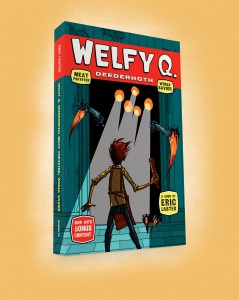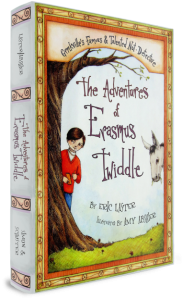 Eric Laster is a YA author, former ghost writer, and orphan/homeless advocate. Welfy Q. Deederhoth: Meat Purveyor, World Savior is the first of a trilogy.
Eric Laster is a YA author, former ghost writer, and orphan/homeless advocate. Welfy Q. Deederhoth: Meat Purveyor, World Savior is the first of a trilogy.
CARL SLAUGHTER: Before publishing your own book, you were a YA ghostwriter. What are some of the YA novels you worked on?
ERIC LASTER: Actually, I published one book under my own name, through Simon & Schuster, entitled The Adventures of Erasmus Twiddle, which is what led to my being hired as a ghostwriter. I’m not legally allowed to disclose specifically what YA novels I ghosted because I signed an NDA (Non-Disclosure Agreement). What I can tell you: I ghosted a fantasy trilogy, two volumes of which perched awhile on the New York Times YA bestseller list. More recently, and unrelated to YA, I worked as the unacknowledged ghost/credited editor of a lush photography book entitled 108 Rock Star Guitars by Lisa S. Johnson, the soft-cover of which comes out in November (obviously, I did not sign a NDA).
Does an author provide a ghostwriter with a synopsis, an outline, a rough draft manuscript, recorded dictation of ideas? Do you meet with the author for a question and answer session? What type of communication and how much communication goes on between a ghostwriter and the author about what the author wants to accomplish with the novel?
I can, of course, only describe how the process worked for me. When I first met the credited author of the YA stuff I ghosted, she told me the plot outline of what would become the first book in a trilogy. After hearing the outline, I said that it sounded as if she knew the broad gestures of the plot, but little else. Yes, she knew the main characters’ general backstories, but she didn’t have a single scene in which characters spoke or interacted with one another, and I said that she’d have to be okay with me making all of it up. Once we came to terms and everything was official (she hired me, not a publisher), I received notes on various elements of the book’s invented world,weapons, means of travel, that sort of thing. In addition to changing some of the given characters’ backstories, I wound up conceiving of a number of my own weapons, characters, and creatures.
Incidentally, though I didn’t say this to the credited author at the time, I suspected at the outset that the broad gestures of the plot would not fully remain once the characters were going about their business. For me, in this kind of writing, there’s a rhythm to a plot or story, which is dictated by what seems natural for characters to think or do, and which is set going once the writing starts. It’s best to listen to that rhythm rather than superimpose a structure onto their doings. If an element of a preconceived plot works,great. If it doesn’t, forget it. So the first book I ghosted did not follow the original outline, though many of the most important broad strokes remained. For book two of the trilogy, I was left alone,meaning that no plot points were discussed beforehand, no ideas bandied about until I’d already started writing. For book three, I made a concerted effort to involve the credited author more in discussions of plot, etc. But in general, for all three books, I would send new chapters every several weeks or so, and we would then discuss them. I was very lucky in that she seemed to like the choices I made. Overall, we had an excellent relationship and are now friends, though we both admit to sometimes feeling weird about the whole thing. Publishers weren’t keen to have both of our names on the books. A proper, exhaustive credit for the trilogy would be: story by credited author and me, written by me.
We did have some rough patches in the beginning. I mistakenly assumed that because I was being well paid, I had to write whatever she told me to write. At one of our earliest meetings, after she’d read some chapters, she suggested a change that I didn’t agree with. “I’m not going to do that,” I said, being really impolitic, and to which she didn’t take kindly. I thought I would quit and return the advance I’d received. We talked it through: as long as I truly listened to and entertained her suggestions, I didn’t have to use them, provided I made a good case for why I wouldn’t. But sometimes what seems (or is) a bad editorial suggestion leads you unexpectedly to good results. You start asking yourself what about the story caused the suggestion to be made in the first place. If you can find the answer to that question, and rewrite the manuscript to pre-emptively counter it (the revision is pretty much never the original bad suggestion), the rewrite,at least for me, so far,is often an improvement.
It’s important to note that when I was hired, since there was no manuscript, there was as yet no publishing deal. A deal was secured only after I’d completed approximately 150 pages of a manuscript. The verbal pitch to editors had always been excellent, but they wanted to see the quality of the writing before making an offer.
What did the credited author want to accomplish with this project? She had a great, commercial conceit that she wanted to see fleshed out as a legitimate narrative. Not being a writer, and realizing that a great conceit wasn’t enough, she went looking for someone who could pen the books, which have become the Big Bang, as it were, of an imagined universe that has now expanded across a variety of media platforms. Sorry to sound like a marketing guy, but it’s true.
Why did you decide to switch from ghoster to author?
As mentioned earlier, I had published under my own name before becoming a ghost. But much as I’d never set out to write for children,Erasmus Twiddle was marketed as “middle-grade” fiction; it came into being after I wrote a paragraph in a voice I didn’t know I was capable of,I never planned on becoming a ghostwriter. I agreed to do it as an experiment, wanting to be less reverential toward what I commit to paper (and yes, I write on actual paper). Not that I ever wished to take less care with what I write. I wanted confidence that, when pressed to revise, I could conceive of word/sentence/plot variants at least as interesting as what I’d originally set down,even more, I wanted to develop the professional habit of always (up to a point!) questioning my choices so as to arrive at more nuanced, more revealing, more fun or dramatic. Five years as a ghost completed, I was eager to publish under my own name again. And while I enjoy writing things like Welfy Q. and YA, I’m simultaneously at work on material for an older crowd.
Why did you choose an orphan as a main character?
Welfy Q. pokes gentle fun at the standard conventions of sci-fi while exploiting them. Welfy is the “prophesied one” in an alien world. I thought the pithiest, most dramatic way to counterbalance this was to make him an orphan, a runaway from the foster care system, a kid who has never been the one chosen for adoption by prospective parents. Plus, I think it’s heroic for anyone, but especially a young person, to survive in the face of misfortune, neglect, systematic indifference, or undeserved hostility.
 What are themes/messages you want young people to take away from this story?
What are themes/messages you want young people to take away from this story?
I don’t think about infusing messages into the fiction that I write. With Welfy Q., themes and motifs developed the further I got into the story. Once the book was finished, I teased out and/or tightened certain narrative threads, motifs, themes. But as to what, specifically, I want young,or any,people to take from this story, I have no answer. What I read in Welfy Q. is not what others will read. The most I hope for is that people find the book both fun and, for one reason or another emotionally resonant. Obviously, I have certain beliefs, an ethical code, and there are subjects about which I feel strongly and am drawn to explore; I wouldn’t be human if these things didn’t find their way into my writing.
Some of the characters’ names are Nnnn and Ffff and Grrrmmph. Is this just for fun or is there a method to it?
It’s “Grrrrmmph” with four r’s. The names are a nod to the great Italian writer Italo Calvino, whose book Cosmicomics features characters with the names “Llll” and “Qfwfq.” Besides, it’s fun to hear Siri stutter over them on an iPhone or iPad. Nor does it seem unreasonable to assume that what we as earthlings might consider goofy names are, elsewhere, to alien ears, not at all goofy. We hear “Ann” and think it’s perfectly normal, but to citizens of distant worlds it might sound just as odd as “Nnnn” does to us.
Some of the aliens say things like “gxo rlimoi Tryndian kcjcio,” “am gxo jcml lr gxo Tryndian,” “xoi jlicgalm ah ilmraimol.” Again, is this just for fun or is there a method to it?
Both. The alien language in the book (less than one page total) is not random. It’s a code, systematically translatable into English. As to the rest of the above quotations, here are the translations: “gxo rlimoi Tryndian kcjcio” means “the former Tryndian palace,” the Tryndian being an alien race. “Am gxo jcml lr gxo Tryndian” translates to “in the land of the Tryndian,” and “xoi jlicgalm ah ilmraimol” translates to “her location is confirmed.” Besides patterns in the alienspeak (the repetition of “gxo,” for example), the book contains further clues that the Brundeedle language can be translated,alienspeak followed by its English equivalent.
I don’t think it’s necessary to translate any of the alienspeak to enjoy the story, if readers don’t want to. Again, the total amount of Brundeedle dialogue takes up less than one page of the entire book. It just seemed wrong to have the aliens automatically speaking English when Welfy first appears among them. Often, bi-linguists will revert to their original language when voicing asides, etc. Why should the Brundeedles be different? But because I’m not a linguist and cannot, like Mr. Tolkien, invent an entire language, I decided to have the Brundeedles’ “gibberish” be a code, which kids who are so inclined can decipher. I had a bit of fun with some of what the aliens say in this code, knowing that only a special group of readers would ever likely decipher it.
The first-edition paperback and Welfy Q. ebook don’t explain any of this, by the way. I was leaving it to readers to figure out on their own. Nor are certain Brundeedle letters underlined or otherwise differentiated with asterisks and the like, as they are in the second edition, to help ease translation. But I’ve included a page at the end of the second-edition paperback that explains the Brundeedle language. It reads:
Out of the seventeen English letters that constitute the Brundeedle language, nine of them look as if they can stand for two different letters in English. For instance, an “a” in Brundeedle might either translate to an English “i” or “z.” To determine which English letter the Brundeedle “a” represents, you need to see if it is underlined. Thus, “a” in Brundeedle equals an English “i,” whereas “a” in Brundeedle translates to a “z” in English. Exceptions to this underline rule are “g” and “j.” A plain “g” is equivalent to an English “t,” but the same letter with an asterisk,”g*”,is equivalent to an English “k.” A plain “j” is equivalent to an English “l,” but if the same letter appears as “˘j” (note the strange smiley mark!), then it is equivalent to an English “q.” Proper nouns (names of people, places, creatures) are not translated.
 Are there going to be further adventures of Welfy?
Are there going to be further adventures of Welfy?
Yes, at least two more books, which I’m currently in the process of writing. But it’s very likely that a different book of mine will be published first. Tentatively titled Aftereffects, it’s a coming-of-age story cum murder mystery, complete with meds, young love/lust, family dysfunction, and an afterlife Walmart. In 2015, I’ll be at BEA and numerous Comicons, both to promote Welfy Q. and to build anticipation for Aftereffects prior to its publication.
Tell us about your involvement with orphans and homeless.
At present my involvement is minimal, and though I’ll be traveling a fair amount next year, I hope to rectify that somehow. Previously, I volunteered as a teacher in a Los Angeles literacy program. I grew up in New York City, where the homeless are omnipresent and yet willed into invisibility by those hurrying past them on the streets. Los Angeles too has a large homeless population. I have been around the homeless and hungry for as long as I can remember, and I have a BIG problem with the most vulnerable members of a population,kids,being punished by society because they got a less than stellar draw in the birth-lottery. Consider this dilemma: you’ve told me that some of the orphans you work with are cynical, and suspicious of do-gooders who appear in their midst, because they know that these do-gooders will soon abandon them. But are the do-gooders any less well-meaning because they vanished? Unlikely. They are, I trust, doing what they can, and very few people are able to devote a large portion of their lives to helping strangers, however much they might want to. Yet I don’t blame the kids for being wary of part-time do-gooders. If they haven’t had a stable homelife, or consistent emotional support from dedicated sources, how can they be expected to accept that fleeting emotional attachments to supportive individuals, largely strangers, are better than no attachments at all? How can it not seem just a cruel tease, a reminder of what they haven’t had, especially when hardships have conditioned sentiment out of them as a means of survival? My involvement with orphans and the homeless is a work-in-progress. On welfyq.com, I maintain an ever-expanding list of resources for people in need. Suggestions to add to the list are always welcome.
Got any advice to aspiring YA writers?
Read, persevere, read, persevere.
 Carl Slaughter is a man of the world. For the last decade, he has traveled the globe as an ESL teacher in 17 countries on 3 continents, collecting souvenir paintings from China, Korea, Thailand, Vietnam, and Egypt, as well as dresses from Egypt, and masks from Kenya, along the way. He spends a ridiculous amount of time and an alarming amount of money in bookstores. He has a large ESL book review website, an exhaustive FAQ about teaching English in China, and a collection of 75 English language newspapers from 15 countries.
Carl Slaughter is a man of the world. For the last decade, he has traveled the globe as an ESL teacher in 17 countries on 3 continents, collecting souvenir paintings from China, Korea, Thailand, Vietnam, and Egypt, as well as dresses from Egypt, and masks from Kenya, along the way. He spends a ridiculous amount of time and an alarming amount of money in bookstores. He has a large ESL book review website, an exhaustive FAQ about teaching English in China, and a collection of 75 English language newspapers from 15 countries.
